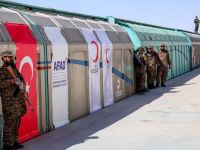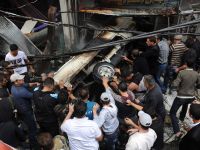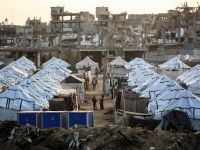The Israeli army directed machine gun fire at the Palestinian village of Beit Jala, near Bethlehem Tuesday after the Jewish settlement of Gilo in annexed east Jerusalem came under fire, witnesses told AFP.
The firing began around 7:00 pm (1700 GMT) and lasted for about an hour, before resuming with greater intensity that included an Israel tank firing, said the agency.
The Israeli firing set a house on fire in Beit Jala, as army assault helicopters flew overhead, witnesses said.
There were no reports of damage or casualties on the Israeli side.
Separately the Israeli army directed fire at the village of el-Khader and the areas around the refugee camp of Dheisheh, near Bethlehem, from a position in the Jewish settlement of Dheisheh, also near Bethlehem, said AFP.
A military spokesman was quoted as saying the army was responding to Palestinian fire from a hill near the settlement.
This is the third straight night of exchanges of fire in the area.
Earlier in the day, deadly Israeli-Palestinian confrontations erupted Tuesday for the first time in three days, said AFP
Israeli soldiers shot dead two Palestinians in separate incidents in the West Bank, breaking a brief lull in deadly violence shortly before the arrival of an international commission tasked with investigating almost 10 weeks of bloodletting, AFP said.
The confrontation was erupted early in the morning, when "armed settlers from Gush Etzion have begun patrolling the Tunnel Road which links their settlement bloc with Jerusalem," according to The Jerusalem Post.
The settlers were carefully instructed by army officers and lawyers on open-fire rules, the Israeli Radio reported, quoting one of the settlers as saying that "anyone who throws stones at Jews must realize now that he will be hurt."
Also, a bomb expoded Tuesday on the Jericho bypass road; no injuries or damages were reported.
The Palestinian stonethrowers clashed with the Israeli troops near el and at the Ayosh Junction north of Ramallah.
In both incidents, the Israeli soilders repelled with "tear gas and rubber bullets," said the daily.
Meanwhile, the paper quoted Fateh secretary in the West Bank, Marwan Barghouti, as calling on the Palestinian security forces to provide protection for Fatah and other leaders from the Israelis who have "attacked them in order to eradicate them."
At the Israeli political stage, Barak, who is due to meet right-wing Likud leader Sharon Tuesday night, said the formation of a unity government was the best option and called again on the Palestinians to end the violence and allow a return to the negotiating table.
"The situation demands a national unity government, but this cannot be forced on anybody," Barak was cited by AFP as telling reporters at a military base outside the northern West Bank town of Nablus.
It will be the first Barak-Sharon meeting in almost two weeks and comes after the return to Israel of former prime minister Benjamin Netanyahu, widely tipped to be plotting a challenge for the nation's top job, said the agency.
"We will keep the window open all the time for the resumption of political negotiations, and, ultimately, this is the only way to solve the conflict," Barak said. "But at the same time we will stand firm, we will resist any kind of attempt to impose the use of force."
Barak, who last week proposed a scaled-down peace deal that was immediately rejected by the Palestinians, brushed aside questions over whether he had any plans to meet Palestinian President Yasser Arafat, amid reports of secret negotiations that have been denied by both sides.
He proposed an interim accord by which Israel would recognize a Palestinian state on 50 percent of the West Bank -- less than he is reported to have offered at July's failed Camp David summit -- and put off the tough questions of Jerusalem and Palestinian refugees for several years.
The latest violence, which followed two nights of fierce gunbattles in various flashpoints in the West Bank and Gaza Strip, flared less than a week before the expected arrival of a five-member panel headed by former US senator and Northern Ireland peace mediator George Mitchell to investigate the causes of the unrest, added AFP.
Israel, dropping early objections, has said it will work with the committee but wants its mandate to be clearly defined before it starts its work in the violence-wracked Palestinian territories, said the agency.
Palestinian officials have said the committee was expected in the region on December 11, almost two months after the Sharm el-Sheikh summit in Egypt decided to set it up.
AFP also said that Israel came under criticism from the United Nations Tuesday over its crippling blockade on the West Bank and Gaza City that has thrown 260,000 people out of work and cost the Palestinian economy at least 500 million dollars.
In a bleak and damning report, UN special Middle East coordinator Terje Roed-Larsen described the closure of the territories as "counter-productive" and voiced fears about poverty rates.
"Unemployment and poverty lead directly to anger and aggression," Roed-Larsen said after meeting with donors to the Palestinians and senior officials in Arafat's self-rule authority.
"Three years of progress have been wiped out in two months of conflict," he lamented, noting that almost half the Palestinians were now living on less than 2.10 dollars a day.
In the Gaza Strip Tuesday, a crowd of more than 10,000 took part in the funeral of a leader of the armed wing of the radical anti-Israeli Islamic movement Hamas, which has vowed to exact revenge.
Awad Silmi, 27, died while apparently trying to plant a bomb near the Karni crossing point between Israel and the Gaza Strip on Sunday in an operation Hamas said was part of its jihad, or holy war, against Israel, reported the agency.
And senior Palestinian negotiator Saeb Erakat warned that Israeli military action against Arab villages will only lead to more violence and extremism.
"Mr. Barak did one thing with his missiles, gunships, siege and closure. He succeeded in silencing the Palestinian moderate camp," Erakat said.
The Post also cited the top negotiator as demanding a full Israeli withdrawal from the occupied territories in 1967, including east Jerusalem – (Several Sources)
© 2000 Al Bawaba (www.albawaba.com)







